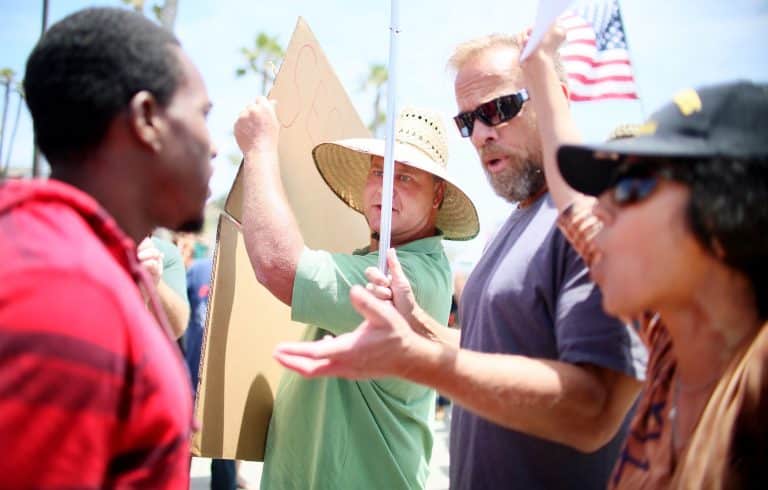
Image by Greg Baker/Getty Images.
When the Question of Worthiness Becomes a Quest for Identity
This election has surfaced the reality that many people in this country are hurting: financially, emotionally, spiritually. Much has been made about poor, white Americans — the abandoned working class — those good old boys with no way to channel their deep desire to be respected providers.
President-elect Trump’s outsider status appealed to them. He wasn’t going to do government as usual; he was going to do big business.
The irony is that it is fundamental economic and demographic changes that have left these men and women (53 percent of white women voted for Trump) feeling left behind. So it’s not change writ large that we crave — change like globalization, change like natural disasters, change like aging. It’s change that we somehow feel in control of — change like redemption.
I’ve been trying to turn from fear and blame to self-examination. When I voted for Obama, when I turned him into a symbol of so much that felt urgent in my own heart, what was that about? His election felt personal to me, like his presidency affirmed my own worldview on some fundamental level. It was as if I did this weird unconscious calculation: I live in a country where someone like him, someone who can quote both Jay-Z and Doris Kearns Goodwin, is electable; therefore, somehow, I exist even more.
Sure, I knew a little bit about his policy platform, but let’s be real, not in that much detail. I mostly knew how he made me feel when he came strutting out to Stevie Wonder on a big stage. His complex upbringing, his public admission that he’d smoked weed, his strong, beautiful wife — all of it mirrored my reality in a way that George W. Bush never had and John McCain never would.
Part of this was about race: if Obama was electable in America, then this meant I was of a country I felt comfortable claiming. I scoffed at arguments that the U.S. was “post-racial” because of Obama’s election, and yet, there was an unclaimed part of me that did feel like his presidency made my whiteness less dangerous, more redeemable.

If I own, humbling as it may be, that my identification with and vote for Obama was not primarily about his policies, but my own projection, then why am I so confused that a quarter of Americans found a parallel projection in Trump?
The change we crave, it seems, is actually belonging. We elect leaders that, by some mysterious emotional calculation, we decide symbolize our own worthiness. At a time when whiteness is losing its power, that question of worthiness becomes even more desperate.
Forty-three percent of Americans didn’t even vote. The vast majority of those who did, I would guess, didn’t painstakingly study the candidates’ policy platforms. Instead, we assembled visual impressions, surface-level media narratives, and some broad messaging into a collage of our social reality and unspoken insecurities. We checked the box that we decided affirmed our Americanness, the country we wanted to believe we lived in.
It leaves me thinking that we need to create a more robust sense of broad belonging in this country so that we’re not so vulnerable to the political manipulation of our desire for it. Just as Obama’s election didn’t, in fact, affirm my existence, Trump’s election doesn’t deny it. As naïve as it may sound, I believe our nation would function better if we were all able to rely less on our political figures for emotional confirmation and more on them for policy acuity. The president is not your friend. And he’s not your father. He may make you feel seen, but it’s your own optical magic trick.
We are strange creatures, we citizens. We swoon when they say “change” when what we really want is affirmation. If only we could get it from people we actually know and love — our sisters and our brothers and our parents, our coworkers and our pastors — instead of trying to find it in the ballot box.

